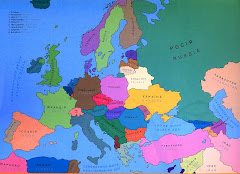 I joined Asya and Sasha for a bike ride on the day of the autumnal equinox. It was a nice day, with a crisp breeze blowing in from the north, from Russia, signaling the start of fall. This ride was longer than the one to Korychevka so I guess you could say I was prepared for it. It took us in another direction, out of town, over the railroad tracks, and way out into the country, through the steppes, the flat farm lands and prairies of Ukraine. The farmers had tilled the rich black soil for the winter. Flat all the way.
I joined Asya and Sasha for a bike ride on the day of the autumnal equinox. It was a nice day, with a crisp breeze blowing in from the north, from Russia, signaling the start of fall. This ride was longer than the one to Korychevka so I guess you could say I was prepared for it. It took us in another direction, out of town, over the railroad tracks, and way out into the country, through the steppes, the flat farm lands and prairies of Ukraine. The farmers had tilled the rich black soil for the winter. Flat all the way.Our destination: an old collective farm, now privately owned but still available, at certain times in the season, for everyone to pick apples. On the way we passed several elderly couples returning to town with large bags of apples, those huge white produce or storage bags. They were obviously old hands at this process. “Probably going to sell them in the market,” Asya said. We were reliving some Soviet survival traditions. Pick them for nothing, sell them for what you can get. A touch of capitalism there, too.
Sasha, a brilliant and highly respected retired doctor, knows Starobilsk and this part of the country like the back of his hand, having lived here all his life. He knows the land and the history. He tells many stories. Asya, a retired English teacher and tutor, translates. We passed an interesting memorial to Ukrainians who had been rounded up, tortured and killed by the Nazis in 1941-3. The dead, he said, were buried there, on the land, no marked graves. "We just know they are there." I would never had known this, however, if I hadn't been with Sasha and Asya. I had never even heard of this event or this statue commemorating it, so far out in the country.I learn new stories every day, and want to know more.
We peddled on, and on and on. We finally came to the very large apple orchard. Sasha knew just where to go to find good trees, and different varieties of apples. We got busy and picked apples for almost three hours, Sasha climbing the trees, Asya and I gathering the fallen fruit. Adam and Eve peered over our shoulders, I think.
Then Sasha expertly packed up the apples and we biked home, stopping along the way to pick what looked like blueberries but are something else. Dark blue berries with pits, like cherries. They are bitter, not sweet, but Asya said they are great in vareneky, a wonderful Ukrainian ravioli. The bushes were full, and we picked a lot of berries, filled our bags, and peddled home. We felt lucky for the bounties of nature, for all the fresh produce we had collected to see us through the long winter. A kind of Rocky mountain high, but on the Ukrainian steppes, not in the Colorado mountains. John Denver would feel connected.
I’m beginning to understand, to grasp fully in the deepest sense, what Chief Seneca meant when he said “All things are connected.” This was Loren's mantra, too.




























No comments:
Post a Comment